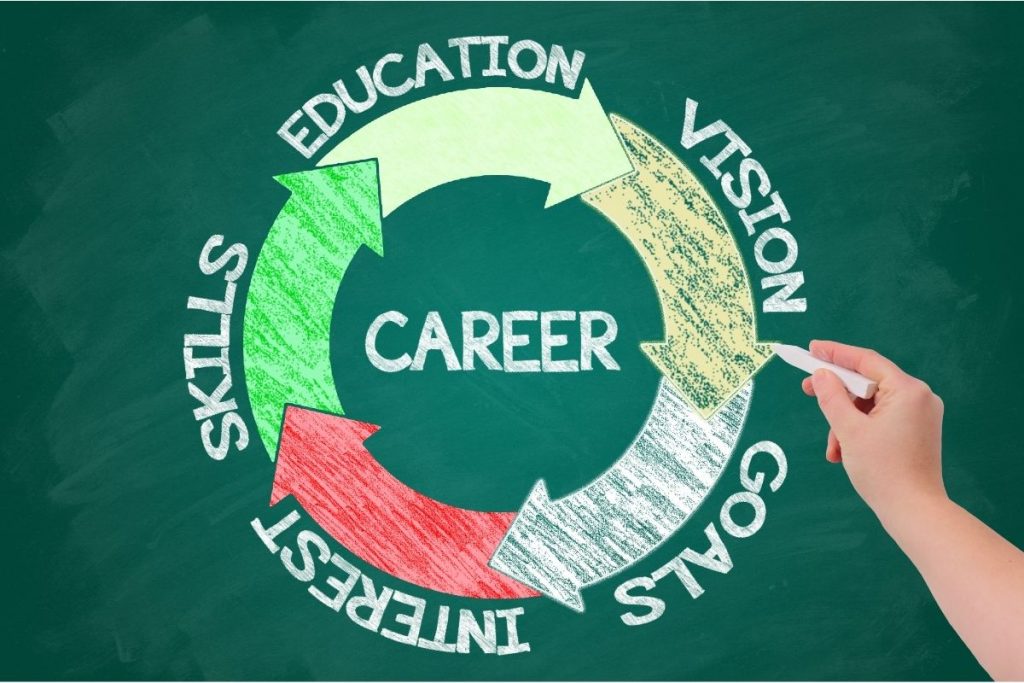
Wondering how to plan your career? If you have ever seen or heard the phrase “career planning” come up in conversation, you are probably wondering what it involves exactly and how to do it.
The fact is, career planning is important and for more reasons than one.
And whether you want to know whether you need to plan your career, or how to plan your career, this guide is going to tell you everything you need to know.
In this short guide, we explain what career planning is, how to plan your career, and what to do if you want to change careers.
Let’s get started.
Table of Contents
What Is Career Planning?
Career planning, also called career management, is the process of discovering what you want to do professionally and knowing the steps you need to take to achieve your dream career.
Career planning involves several different steps that can help you to understand who you are, what you are good at, and a career that is not just what you want to do but what is ideal, or suited, for you.
Career planning is not difficult, but it does require a good amount of self-discovery, research, and goal setting. Ultimately, career planning can be a rewarding experience that benefits you in the long run.
Why Career Planning Is Important
The main question: why is career planning important?
Career planning is important because it will help you to find out what you want to do professionally in life (your calling) in a way that can lead you to success and happiness in the shortest amount of time.
Career planning does not just help you to narrow down careers until you find your perfect job, but it can also help you to discover more about yourself and what you need to be happy.
Put simply, career planning is a wonderful learning experience that also doesn’t have to be done just once.
Of course, interests change, as well as our values and what we enjoy, and therefore career planning can be important at various stages of life.

How To Plan Your Career
Career planning can be broken down into three main steps: self-assessment (or self-discovery), career exploration, and, finally, taking action.
Throughout each step, you will find that there is a lot of self-reflection, thinking, note-taking, research, and goal setting involved. While this might sound daunting, these steps are split up in a way that is perfectly manageable.
Despite that, there is a good chance that you might also find career planning enjoyable!
Self-Assessment
The first step in career planning is to consider yourself – specifically what you enjoy doing/are interested in, what makes you happy in general, and what you are good at (your talents).
These three things are crucial for narrowing down your ideal career.
Of course, there might be things that you enjoy but are, unfortunately, not good at. At the same time, you might be good at something but not particularly enjoy it.
As an example, you might be interested in general health, find happiness in helping others, and be good at communication.
The key is to think hard about these three things and write them down in lists. This will help you to see them clearly and find the correlation between them.
Ideally, the goal is to find one that appears in, or relates to, all three lists.
Career Exploration And Identification
Once you have found something, or even a few things, that each fit under what you are interested in, make you happy, and what you are good at, you can then work out several careers that might suit you personally.
As an example, if you enjoy working with numbers, being alone, and are naturally good at using spreadsheets, a possible ideal career path would be becoming an accountant.
This process is called career exploration. The idea is to consider all possible career paths, as well as the various jobs involved within that career, and then weigh up the pros and cons of each.
The result is career identification. This is where you have narrowed down all possible career opportunities into one or two options that you feel excited about and are motivated to achieve.
Taking Action
The last step of career planning is taking action, which involves researching your chosen career path, the steps you need to take to achieve it, and then setting manageable goals for yourself.
When researching your career path, consider the education you might need to undertake, the qualifications and CV requirements.
The time you will have to invest, as well as how to get your foot in the door – such as enrolling in an apprenticeship.
It is also worth considering where you need to study, as well as where the career is based, or most common. For example, some careers might require you to move to the city.
Once you know the steps you need to take to achieve your career and are happy about it, the final step is to set goals and take action.
Changing Careers
Is it bad to change careers? Is changing careers a good idea? Of course, we are not always sure what we want to do at a young age – or even way into adulthood.
Similarly, interests and values change in the blink of an eye. We can also discover new things about ourselves, as well as the career we ended up choosing, only after getting the experience.
Due to those things, it is not a bad thing to want to change careers. In fact, changing careers is common, even among people who are in their 30s, 40s, and 50s.
This is another reason why career planning is important, as not only can it help you to discover your “true calling” early on, but help you to re-assess yourself and your ideal career at a later stage in life.
Conclusion
In conclusion, career planning is important for more reasons than one. It can help you to discover yourself, find the career that is most suited to you, as well as achieve that career in the shortest amount of time through knowledge and goal setting.
Career planning is also highly beneficial in terms of general happiness.
Not only can it help you to achieve your desired career and all the success and happiness that comes with it, but find out who you are as a person, what you enjoy, and what makes you happy.









